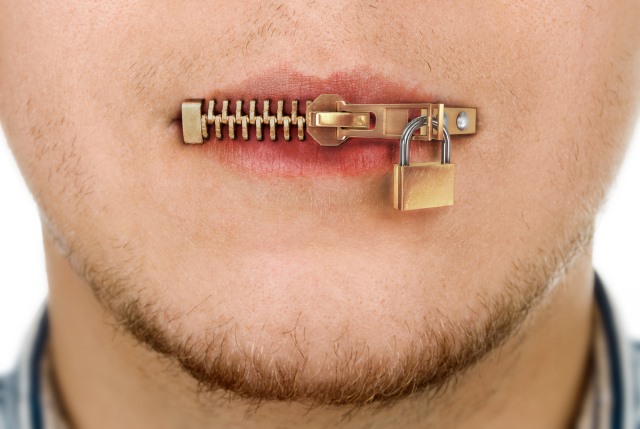Microsoft refuses to answer questions about forced Windows 10 downloads

Just last week Microsoft managed to piss off a lot of people by secretly downloading the Windows 10 installation files to their computers without permission. The comments from BetaNews readers were plentiful, but divided. Some didn't see the problem, while others thought it to be invasive and presumptive.
But there was one question that popped up again and again -- just what the hell was Microsoft thinking? I decided to try to find out but found that the company was somewhat cagey with what it wanted to say on the matter. This is not on. People are more than a little annoyed, and they are demanding answers. They deserve them.
As we know from the original story, Microsoft had already been approached by The Inquirer and issued a statement that said: "For individuals who have chosen to receive automatic updates through Windows Update, we help upgradable devices get ready for Windows 10 by downloading the files they’ll need if they decide to upgrade. When the upgrade is ready, the customer will be prompted to install Windows 10 on the device."
This is very matter-of-fact and soulless. It also fails to take into consideration the idea that a lot of people might have no interest in upgrading to Windows 10, now or at any point in the future. Why would they want to download the installation files 'just in case'? There are plenty of households and workplaces with many computers -- if they all download Windows 10's installation files without permission that's a lot of bandwidth, and not everyone is lucky enough to enjoy unlimited bandwidth.
I, for instance, live in a remote place. If I want a decent internet connection, I have to pay for satellite. This is not only not cheap -- certainly nowhere near as cheap as traditional broadband -- but it also has download limits. I could pay for an unlimited connection, but it's prohibitively expensive. I have to be careful how I use the internet and do what I can to stick within my allowance. I don’t appreciate anything that secretly uses my connection, and I know that I'm not alone.
I got in touch with Microsoft to find out what on earth prompted the company to push Windows 10 at customers so aggressively. I was told that someone would get back to me, but by the next day there was no response -- so I chased it up again. Again I was told that it was being looked into.
All went silent.
Microsoft really didn’t seem keen to answer my questions.
A full four days later I received a reply.
It was the same boilerplate statement that had already been provided to The Inquirer.
In my original contact with Microsoft, I pointed out that the forced download of Windows 10 was far from ideal for anyone with a slow or metered connection. Was anything being done to protect people who might find themselves hit with large bills?
Yes. Specifically, Windows 8.1 does not automatically download updates or apps if it detects that your PC uses a metered connection. Windows 7 and Windows 8.1 customers can both control how Windows Update downloads and installs updates, including the ability to receive notifications before downloading updates. These capabilities can prevent customers from downloading updates which may cause them to exceed their data capacity allocation.
This is all well and good, but it is reliant on Windows correctly determining whether a metered connection is being used. It does nothing to help those people who need to stick to a monthly download limit, or who have a very slow connection.
This answer wasn't good enough for me, so I pressed Microsoft further. I sent a further email:
I'm not sure that really answers the questions I asked in my original email, however.
It's all well and good to say that the aim is to provide a 'smoother upgrade experience', but is it not rather presumptive?
It's one thing to deliver update superficially for Windows 7 or 8.1 through Windows Update, most people would agree that it is quite another to deliver an entirely new version of Windows, regardless of whether it is actually installed or not.
The question of metered connections... what if Windows does not correctly identify a metered connection? What about people with download limits that they need to stick to each month? What about people struggling with a slow connection who don't want things slowed further while a huge 'update' is downloaded? It's fine to say that customers can control how updates are received, but this ignores the fact that most people simply don't change any settings -- they don't know how to, they are scared to, or whatever. And why would they change anything? The advice has long been to leave Automatic Updates enabled so that important fix are installed as quickly as possible without then need for intervention. The downloading of Windows 10's installation files could in no way be seen as an 'important fix', and yet is downloaded anyway.
I'm interesting in understanding the thinking behind the decision to deliver the upgrade files in this way, and for a proper justification for how things have been done.
Once more, no response was forthcoming until I chased up yet again. The reply?
Thank you for your patience as I looked into this. We have nothing more to share beyond the statements I provided to you earlier.
Really? That's it? Thanks for nothing! We, as Microsoft customers, have genuine concerns and questions that we'd like addressed. "We have nothing more to share" simply doesn't cut it. It's not good enough by any stretch of the imagination.
This is supposed to be the new Microsoft, the Microsoft that listens to customers. But it seems that the company only wants to listen when it is convenient, or when it is beneficial to do so. That's not on.
Photo credit: urfin / Shutterstock
